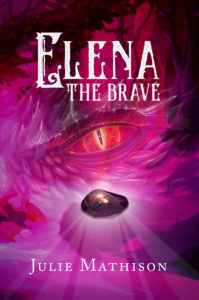“The Hidden Value of Reading ‘Above Level’”
Here in the information age, we love our boxes. I recently read an interesting post on Unleashing Readers entitled “This is my Anti-Lexile, Anti-Reading Levels Post.” I’m not an educator: I’m a former child-reader, a parent of two reading teens, and an author of middle grade and young adult novels. I didn’t know about Lexile numbers until I read this post, but I agree with the author’s perspective on it. Here’s why.
I came of age reading “old fashioned” children’s books – Heidi, The Hobbit, A Wrinkle in Time, Little Women, The Borrowers, Anne of Green Gables. The list goes on and on. These books contain complex vocabulary and diction. They take their time; they’re not concerned with “grabbing eyeballs.” And accordingly, I sank into these books, dwelt there, and I absorbed the complexity without even knowing it.
Take The Hobbit, for instance. I first read it during elementary school, then again as a teenager, then a few times as an adult, and at each age, the book enchanted, engaged and delighted me. Most likely, there were words I didn’t know when I first read it as a child, and some of the complex diction might have lost me, but did that make any difference to my experience? No. I was swept away from the first word, lost in a world of magical creatures. I remember the trolls! Gollum, deep under the mountain by his subterranean lake! I was there, living this book, and I have the memories to prove it. The intimacy of that experience is its own reward, but I’m also convinced that these complex books developed my imagination, my thinking, and my capacities in ways that are impossible to measure.
To the extent that the Lexile rating system embraces the educational value of linguistic complexity for the developing mind, I wholeheartedly agree. But the dangers are apparent. When readers are discouraged from reading “above level,” even if that is not the system’s intent, they miss out on the myriad of ways in which encountering language beyond our ken stretches us. When a child is captivated by a book that is “above level,” that complexity engages their faculties unconsciously, effortlessly. Interest drives one beyond one’s perceived boundaries. A child reads for love and gains the educational benefits anecdotally.
But then, I’m a curmudgeon of the analog age, a dinosaur, doomed to live on beyond my time. I noted, in a peripheral fashion, the rise of assessment in education during the 90’s—a rise that perfectly coincided with that in most other sectors. My husband’s corporate job devolved into a mind-numbing “capturing” of information as middle managers sought to compare like with like. Widgets. What was once “consulting” became “information-gathering.” That’s hard enough to see in the adult sphere, but when it becomes the defining context of the education of our children, it’s heart-breaking.
Ricki and Kellee got it spot on in quoting Teri Lesesne’s Reading Ladders in their Anti-Lexile Post: “rigor should be determined by sophistication of thought, depth of character development, stylistic choices, and mastery of language on the part of the author.” And I cannot say it any better than the author of that post when she counsels that the best way to guide young readers is to read, read, read.
Let’s bring back intuition! Creativity. Personal judgement. Let’s empower teachers to do what they already do – teach real, live, individual children. I’d even welcome a few of the pitfalls that inevitably result from empowering discretion. The attempt to quantify the qualitative has always been, to my mind, a doomed expedition, fraught with danger. Enthralled with the map, we forget the territory and lose our way. I would love to see our children’s libraries stuffed to the ceiling with enchanting, enthralling “above-reading-level” tomes, and children empowered do just what I did – bring home armloads of books, lay them out on the floor, and decide which world to enter first. Because no imagination can be captured by a metric.
Old Rus #2
Publishing March 1st, 2022 by Starr Creek Press
About the Book: From award-winning indie author Julie Mathison comes the sequel to BookLife Semifinalist VASILISA.
Old Rus, a land of witches and ogres, bogatyr warriors and six-headed dragons, magic and myth. A land lurking below the waking world, a fabled land – except for the chosen few.
It’s 1942, and the world is at war. Elena Petrovna Volkonsky is just a schoolgirl in a Pennsylvania steel town, the Russia of her forebears long forgotten – except in tales, sung by her babka in haunting tones. Elena can picture Old Rus clearly as she ponders her pet rock, its surface black and smooth, but its depths strange. Such visions! The snow-swollen Dnepr, wending southward through the wild steppe all the way to Byzantium. Vladimir of the Bright sun, ruling from glorious Kiev!. If only it were real. If only hers was not just an ordinary family in trying times. An ordinary family – with an extraordinary destiny.
Be careful what you wish for.
Meanwhile, Old Rus is in crisis. A dragon flies, a maiden is captured, and the great bogatyr, Dobrynya, is tasked with her rescue. But his son, Mitya, senses treachery on all sides. How can you save a man who will not save himself? And must he venture alone, trailing his father across the steppe where warring nomads range, even to the distant peaks of the Sorochinsk Mountains? He is prepared to do just that when a strange girl appears in the prince’s stables and upends all his plans.
What happens when two worlds – and hearts – collide?
About the Author: Julie Mathison is the founder of Starr Creek Press and the award-winning author of books for young people that seek to delight, transport and inspire the child inside every reader. Her debut novel, Believe, won the 2021 Eric Hoffer Book Award for best middle reader and First Horizon Award for debut books. Vasilisa, Book One in her Old Rus series, was a 2021 BookLife Prize Semifinalist. She lives in the Pacific Northwest with her husband, two teenage children, six sheep, four goats, one dog, and more chickens than you can shake a stick at (literally, she has tried). Visit her at https://www.juliemathison.com.
Thank you, Julie, for this addition to our Anti-Reading Level post! It was great to have another point of view.


